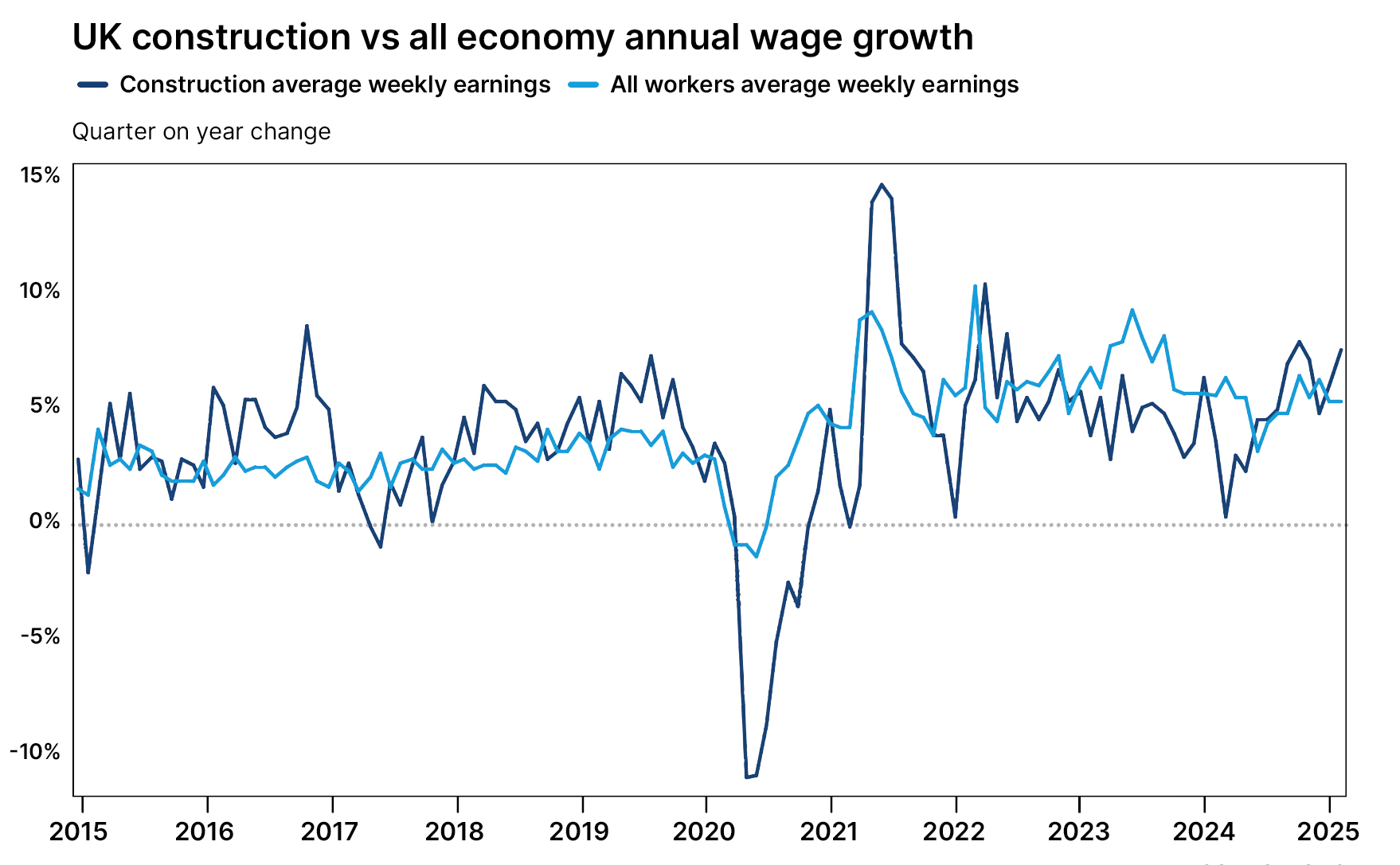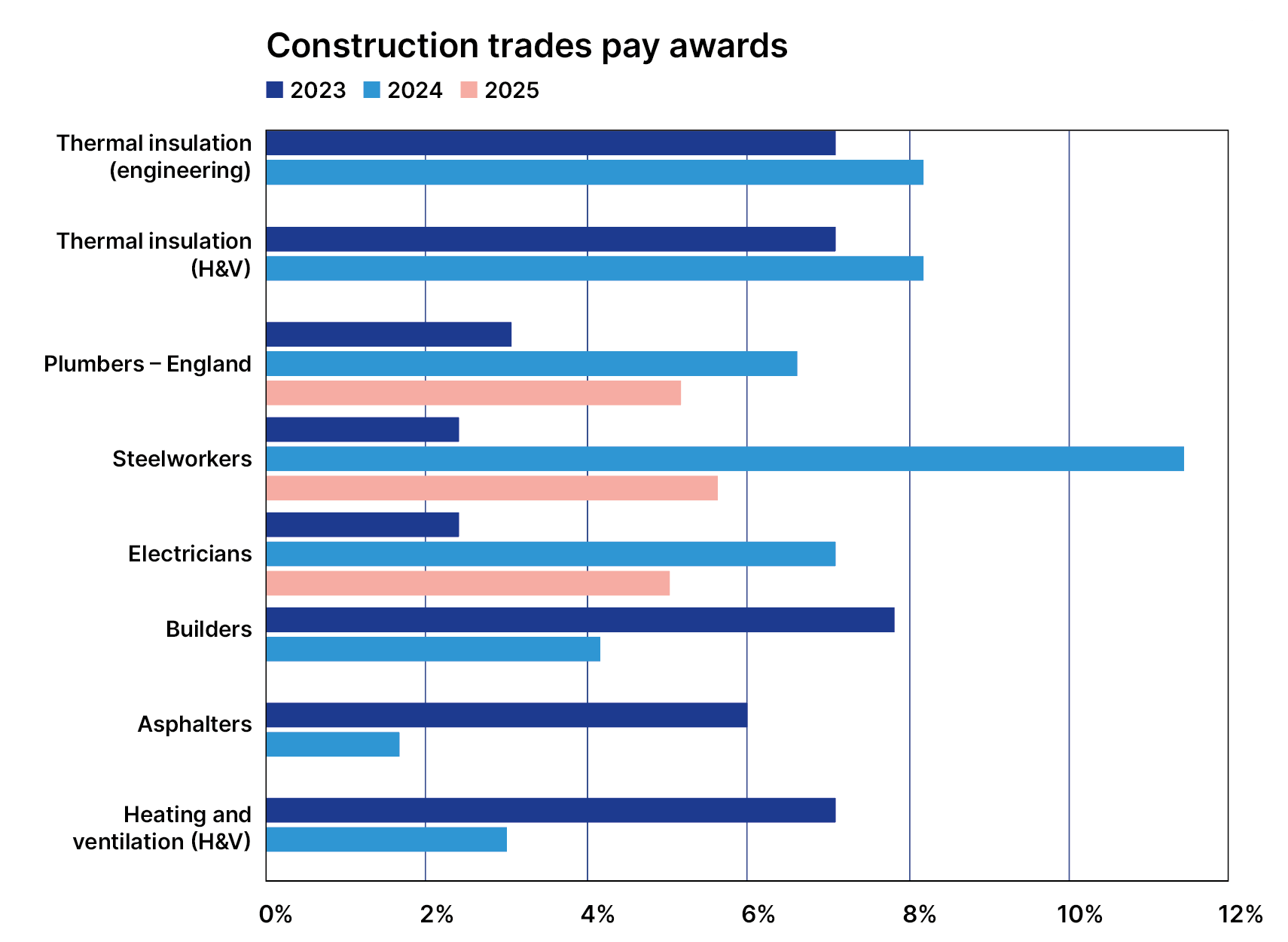
The industry’s persistent skills shortage is pushing wage inflation while also thwarting project delivery, writes Nitesh Patel.
Wages in construction are rising at a faster pace than across the wider economy. The Office for National Statistics (ONS) reported that average weekly earnings in the industry accelerated to 7.5% in the year to February, from 6% in January. In contrast, the average increase across the economy was 5.3%.
Softer construction demand has not meant lower wage growth. This is partly because vacancy levels, although falling, are still above their pre-Covid levels as firms struggle to replace workers leaving the sector.
At the heart of this is the industry’s most pressing issue: the chronic shortage of skilled workers. Construction’s share of the UK labour force is currently at a record low, and the industry has experienced a steady loss of workers.
In 2019, there were 2.4 million workers in construction. By 2024, this figure had dropped to 2.1 million, a fall of 11.8%. During the same period, the number of self-employed workers fell by 20.3%, while those employed dropped by 6.2%. The decline in self-employed workers could be linked to the rise in construction insolvencies, although some left for health reasons, to retire or following post-Brexit regulation changes.

Continued skilled labour shortages are driving wage inflation and hindering project delivery. Contractors have highlighted this as the most pressing challenge to deliver on projects, surpassing concerns over rising construction costs. Lack of skilled workers is also undermining project efficiency, leading to delays, reduced productivity and operational bottlenecks.
Demographic factors mean these losses to the labour force haven’t just caused a short-term reduction in capacity – they’re also creating long-term challenges.
Recruitment push
Research by the Construction Industry Training Board (CITB) estimates that the UK needs to recruit an additional 251,500 construction workers by 2028 just to meet demand. To bridge this gap, the government announced in March a package to train up to 60,000 more skilled construction workers by 2029, including engineers, bricklayers, electricians and joiners. While this is a move in the right direction, a considerable shortage of workers remains.
Initiatives such as the Growth and Skills Levy are providing ways for older tradespeople to transfer their skills to the next generation. One approach could be to incentivise workers to make a phased transition to retirement by training apprentices. Another could be upskilling between sectors, such as Network Rail’s ‘conversion’ courses to help bricklayers with a residential building background transition into the rail sector.

Based on Building Cost Information Service (BCIS) data, skilled tradespeople, such as thermal insulators and steelworkers, saw above-industry-average pay increases in 2024. It also reported large pay rises for semi and unskilled workers, though this data refers to Q2 2024 only.
High wage inflation is putting significant pressure on contractors’ margins. On an individual project basis, contractors now typically only make a profit of between 3% and 6%. Analysis of the larger firms’ financial results reveals that, in some cases, big contractors are making even less.
Margins are also being squeezed, with employers having to pay an additional 1.2% in National Insurance contributions for each staff member. This could constrain employers from granting high awards in the future.
Nitesh Patel is a lead economist at Turner & Townsend
Comments
Comments are closed.












The construction industry has not done enough lobbying of politicians or influenced school/college careers advice over the past 50 years and we are now suffering the consequences. When I started my RICS/ CIOB training at a technical college in the early 1960’s there was a plentiful supply of young talent. However, neo liberal policíes destroyed public sector building, relying on the prívate sector too much, this resulted in boom/bust and caused large numbers of people to leave the industry.
When you consider that in the north west we lost Alfred McApine due to bad financial management under Carillion. Including 1 major house build listed in the FT100 construction sector it’s difficult to see who will train these apprentices give them stable employment and a decent wage along with a good company pension and pay them regularly and on time.